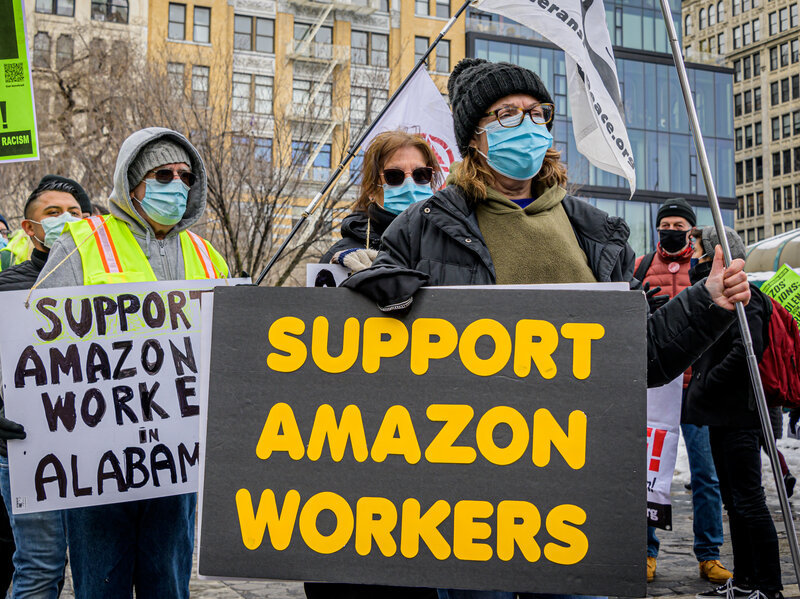Attention Unionists: A Crucial Political Moment is here & it Requires Filibuster Reform
By Rhea Almeida
On April 9th, after a monthslong attempt to unionize workers at Amazon’s warehouse in Bessemer, Alabama, final votes were tallied and the union effort failed, handing the retail giant a decisive victory. For years, workers nationwide have alleged mistreatment by Amazon, including low wages, long hours, and even being forced to urinate in bottles due to fears of being punished for taking breaks and not meeting the company’s unrealistic work demands. This was the most recent issue in years of similar unsuccessful and costly attempts to unionize at Amazon, the second largest employer in the US after Walmart. However, despite its failure, Bessemer’s drive to unionize was the most significant challenge the company faced in its history. Labor activists across the country had their eyes on the unionization vote taking place in Bessemer, hoping it would be a harbinger of change for all workers.Â
Organizers at the Retail, Wholesale and Department Store Union (RWDSU) attribute the effort’s failure to anti-union moves by Amazon, whose “Do it without dues†campaign urged workers to refrain from investing in union membership through text messages, mandatory meetings during work hours, and bathroom signs. Others blame gaps in the union’s overall strategy to mobilize workers. Either way, this loss is not all that surprising and carries the stench of age-old anti-union corporate tactics used by retail giants like Walmart. Isolated union efforts, while powerful symbols, are increasingly easy to quash. However, what is new and surprising is the prominent political support that the labor movement garnered over the last few months. And while this support is crucial to strengthen the pro-union narrative, it is only tangible for workers if translated into policy.Â
The unfortunate reality is that most pro-labor policies, whether it’s raising the minimum wage or the fight for basic income, do not get past the Senate’s filibuster. As labor reporter Hamilton Nolan wrote last month, “The filibuster is a barrier to progress in worker rights, just like union-busting law firms and greedy bosses are.†Other labor activists have also started to address this real barrier as America’s largest federation of unions, the AFL-CIO, urged the Senate to end the longstanding filibuster rule in March, and individual unions such as the Communication Workers of America (CWA) beginning to campaign against the filibuster as a crucial labor move. Therefore, the best strategy for unionists to capitalize on that support would be to do it on Capitol Hill, starting with a push for filibuster reform.Â
A Crucial Political Moment
A month prior to the failed vote, Senator Bernie Sanders (I-VT) held a powerful rally in Birmingham, Alabama just 20 minutes from Bessemer. He was addressing a group of the same Amazon warehouse workers, 85% of whom are Black. Standing in a union hall, the veteran politician invigorated the crowd of workers reminding them of the ripple effects their collective action could have nationwide. “What you’re doing is for workers across the country,†the mitten-clad stalwart affirmed. And his voice was not alone.Â
In a surprisingly bold move, on February 28, 2021 President Joe Biden came out in strong support of Amazon workers in Bessemer (without directly naming Amazon). “Every worker should have a free and fair choice to join a union. The law guarantees that choice. And it’s your right, not that of an employer, it’s your right. No employer can take away that right. So, make your voice heard,†was his rallying cry. This contentious support came in the backdrop of the COVID-19 pandemic where workers are considered essential in helping the company meet its high demand in online orders. Interestingly, an equally intentional show of support was seen from across the aisle.Â
Two weeks after Biden, Republican Senator Marco Rubio stated in no uncertain terms, “When the conflict is between working Americans and a company whose leadership has decided to wage culture war against working-class values, the choice is easy — I support the workers. And that’s why I stand with those at Amazon’s Bessemer warehouse today.†The symbolic significance of this declaration, coupled with the President’s solidarity, is unique, and defines an important shift in the political narrative around unionism in the 21st century. One that has chief political voices on both sides of the aisle standing alongside workers, pointing fingers at one of the most powerful employers of the world.Â
At a time when union membership is steadily declining, only 11% of the US’ working population is unionized, and corporate anti-union tactics continue to disincentivize workers from organizing, narrative symbols of this kind matter. However, symbols alone don’t make lasting change. And unfortunately, as seen in Bessemer, neither do isolated organizing efforts. Policies do.Â
The Need for Filibuster Reform
In the same month that this unprecedented political support for Amazon’s unionizing workers was declared, the Senate voted against a measure to increase the Federal minimum wage to $15 per hour by 2025. With the knowledge that such a provision would never independently make it through Congress, Democrats chose to Trojan Horse it inside a COVID stimulus relief package. The proposal closed 12 hours after it began, earning itself the title of one of the longest open votes in modern Senate history. The vote ended at 42-58, falling well short of the filibuster-proof 60 votes needed as 7 Democrats went against the tide of their own party. And the Federal minimum wage remains unchanged since 2009.Â
The failure of this policy in the Senate is an important hitch in an otherwise rising trend of political support for unions. Important, because it teaches us that affirmations of support need to be followed up with tangible policies. The labor movement of the 1920s and 30s gained immense momentum with the rise of institutions like the Congress of Industrial Organizations (CIO) , the explosion of nationwide sit-down strikes, and collective bargaining power featuring immigrant, Black, female, and other minority workers. However, the movement was then backed by important policymaking that codified that momentum into law. The labor movement of the 21st century has to recenter policymaking as the main vehicle for change, and that means overcoming a mammoth roadblock – the filibuster.Â
For any meaningful pro-worker policy to pass through Congress — be it minimum wage protection, basic income allocations, or the Protecting the Right to Organize (PRO) Act that just made it through the House — Democrats need to lead the charge against policy paralysis. These policies will protect a worker’s right to unionize, and provide important wage floors – but this current filibuster rule makes it impossible for them to become a reality. For Biden to follow through with his strong defense of workers, reminiscent of Franklin D. Roosevelt’s codification of industrial democracy in the New Deal, he will have to put his weight behind legitimate filibuster reform. In March, the President proposed a plan to reform the filibuster and make it easier to pass legislation in the Senate – a crucial step in the right direction. Therefore, as pro-union activists collectively bargain for tangible change, they must advocate for this change in the filibuster rule as a part of the workers’ rights agenda.Â
Author

Rhea Almeida is second-year MPA international student at NYU Wagner hailing from Mumbai, India. In the past, she has worked in the fields of policy, advocacy, and development for a women’s working rights group in India. Prior to that, she worked as a TV news journalist in New Delhi. Her areas of interest include workers’ rights, gender equality, grassroot level advocacy and coronavirus response policy. In addition to being contributing editor for The Wagner Review, she serves as senator for the Wagner Student Association, and events chair for the Wagner Policy Alliance. She is also the co-founder of the ‘What’s up with Coronavirus Policy’ discussion group.
Photo: Erik McGregor/LightRocket via Getty Images




